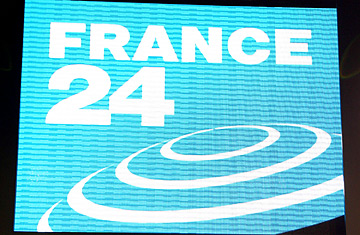
France will enter the competitive international television news market with the launch of France 24, a 24-hour news network in French and English, providing a French perspective on world news.
The new channel is a 50-50 joint venture between the state-owned France Tlvisions and the country's biggest private channel, TF1. Its half-hourly news bulletins are broadcast in both languages from its studios south of Paris; an Arabic version is planned for next year, and there are even provisional plans for programs in Spanish. By cable and satellite, France 24 claims to reach 190 million households in Europe, Africa, the Middle East and Asia, as well as viewers in Washington, D.C., and New York. For the rest of the world, otherwise adrift in a sea of what the French call "le mdia anglo-saxon," it's available via the Internet.
Chirac is normally a stickler for promoting the prestige of the French language; he famously stormed out of a joint press conference in Brussels last year when the head of the French employers' association had the unpatriotic audacity to speak in English. But for France 24, the message is apparently considered more important than the linguistic medium: after all, outside of West Africa none of the target zones is francophone. So how is the vaunted French view on the world different? "It's a little less binary, a little less Manichean, more panoramic," says Grard Saint-Paul, a former Washington television correspondent and the new station's managing director for news. Saint-Paul says he's proud that the station treated Saddam Hussein's hanging "with sobriety, and the jubulation afterwards with moderation; after all, we don't put an end to barbarity by showing more barbarity." But the station still seems to define itself more by what it is not than by what it is. "I think CNN has sent a pro-Bush message from Iraq," says Saint-Paul, who insists that "our editorial independence is our most important asset."
Maybe so, but France 24 had a controversial and politically charged birth. Less than three months before its December launch, respected journalist Ulysse Gosset stepped down as the channel's managing director for news after clashing with the station's board chairman, Alain de Pouzilhac, whose previous career was in advertising rather than news. Rumors of political maneuverings have been so thick that late last month an editorial in Le Monde accused the channel's bosses of "schemings unworthy of a banana republic."
But so far, the channel seems hampered more by limited means than by unseemly political influence. It managed to get a team of reporters and producers off to Somalia to cover the war there, but generally has to depend heavily on news agency correspondents or freelancers. There is still an air of improvisation on the set and frequently on the screen, which features more people talking about the news than it does innovative news-gathering. On the other hand, Gosset has kept his anchor spot for the channel's main talk show, and Saint-Paul, his replacement, insists he's still pushing for journalistic improvements. "The criticism of the birth will soon be forgotten," says Saint-Paul. "Our progenitor was Chirac, but that's not a label that will stick to us forever."
They better hope not, since as spring elections approach Chirac is almost sure to be in his final months as president. France 24 still has to prove and improve itself so that France's next president feels no temptation to yank its funding — and perhaps find other ways to express France's unique if ineffable destiny.
